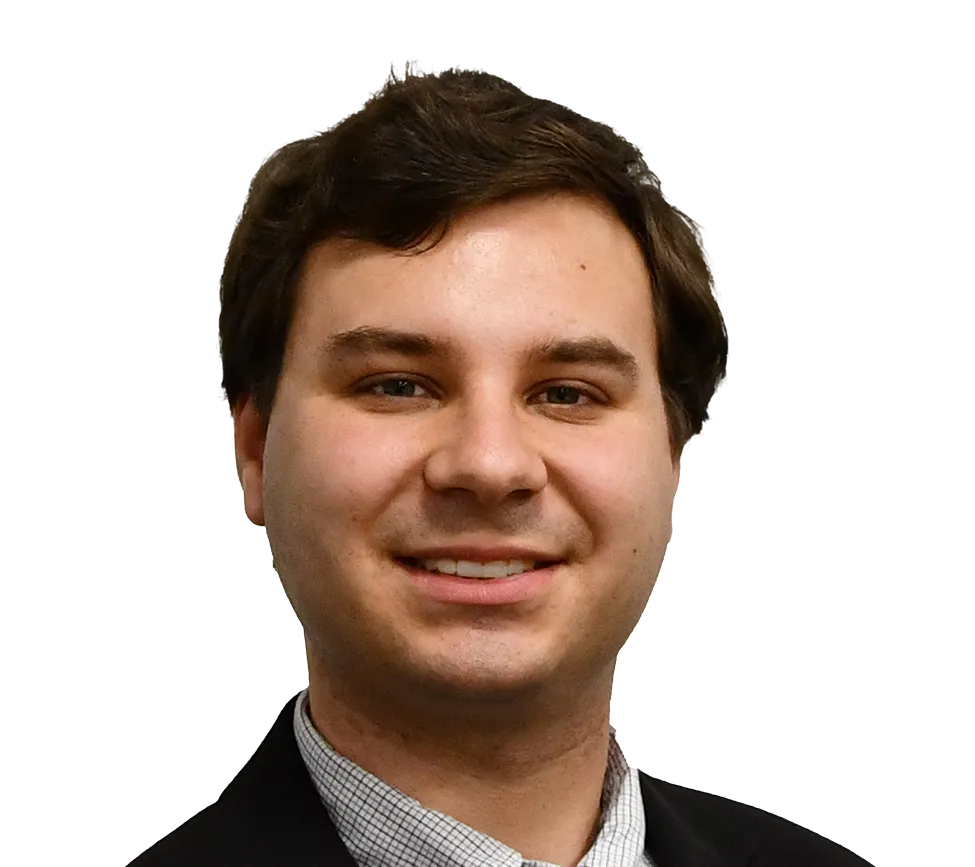

- Ph.D., Mechanical Engineering Materials Science, Duke University, 2022
- M.S., Mechanical Engineering Materials Science, Duke University, 2021
- B.S., Mechanical Engineering, University of Pittsburgh, 2018
- Professional Engineer Mechanical, Florida, #102546
- Professional Engineer Mechanical, Georgia, #PE052358
- Professional Engineer Aeronautical, Massachusetts, #60312
- Professional Engineer Mechanical, North Carolina, #056184
- 40-Hour Hazardous Waste Operation and Emergency Response Certification (HAZWOPER)
- Certified Vibration Analyst (CVA), Category II per ISO 18436-2
- Certified Fire and Explosion Investigator (CFEI)
- Certified Vehicle Fire Investigator (CVFI)
- Duane P. Jordan Early Career Award, ASME, 2025
- North Carolina Space Grant Fellow, 2020 – 2022
- Society of Automotive Engineers Doctoral Scholarship, 2020 – 2022
- NSF Graduate Research Fellowship Program Honorable Mention, 2020
- Forever Duke Student Leadership Award, 2022
- ASME Turbo Expo Early Career Engineer Award, 2022, 2023, 2025
- ASME Young Engineers Turbo Expo Award, 2021
- Gamma Sigma Alpha Graduate Award
- Omicron Delta Kappa Graduate Award
- Top Graduate Engineering Presenter for Sigma Xi Annual Meeting
- Top MEMS Undergrad Student in 2018
- NFPA 37 Standard for the Installation and Use of Stationary Combustion Engines and Gas Turbines – Principal Member, December 2025
- Global Power and Propulsion Society – Ambassador Membership, January 2024
- Sigma Xi Scientific Research Honor Society – Associate Membership, July 2020
- American Society of Mechanical Engineers – ASME, January 2019
- American Institute of Aeronautics and Astronautics – AIAA, January 2019
- Gamma Sigma Alpha Greek Academic Honor Society – Member, November 2017
- Pi Tau Sigma Mechanical Engineering Honor Society – Member, November 2016
- Omicron Delta Kappa Leadership Honor Society – Member, March 2016
- Tau Beta Pi Engineering Honor Society – Member, November 2015
- German
Dr. Hollenbach utilizes his aptitude in mechanical engineering to provide technical consulting involving thermal-fluid systems, aeroelasticity, aerodynamics, vibrations, fluid-structure interaction, and turbomachinery. He applies the fundamentals of mechanics, aerospace engineering, physics, and mathematical modeling to investigate performance and failures within thermal and fluid systems. He has performed inspections ranging in size from residential to large-scale industrial facilities and processes, written reports for both domestic litigation and international arbitrations, and conducted both experimental and computational analyses for a variety of projects.
Dr. Hollenbach is active within the American Society of Mechanical Engineering (ASME), the American Institute of Aeronautics and Astronautics (AIAA), and Tau Beta Pi Engineering Honor Society. He was recognized as an ASME Early Career Leadership Intern Program to Serve Engineering (ECLIPSE) member as well as a Non-Destructive Testing RISE Leadership Development Program member in 2023. He has reviewed technical articles for ASME Turbo Expo, Global Power and Propulsion Society, and the International Symposium on Unsteady Aerodynamics, Aeroacoustics, and Aeroelasticity of Turbomachines (ISHUAAAT). Dr. Hollenbach's work comprises the following fields:
AVIATION & AEROSPACE SERVICES
Dr. Hollenbach is a licensed Aeronautical Engineer and has consulted on large scale aerospace related arbitrations. Previous projects have included assessing composite aircraft coatings, investigating helicopter wreckage, and conducting technical analyses involving combined cycle turbomachinery power plants. He has performed domestic and international inspections in a number of these cases. Dr. Hollenbach draws upon his graduate school work in the field of rotating machinery, where he has published articles at the Turbo Expo Conference and in the Journal of Turbomachinery.
ROTATING MACHINERY, FLUID AND HEAT TRANSFER EQUIPMENT
Dr. Hollenbach has performed technical evaluations on compressor and turbine technologies including fundamental calculations, numerical simulations, and laboratory scale testing. Moreover, he has conducted structural and vibrational analyses to predict and evaluate the failure of turbomachinery blades. He has designed and tested various vibration absorbers, including a sloshing fluid tank for non-linear responses. He uses fundamental thermodynamic principles to evaluate efficiencies of various types of industrial equipment. He applies his knowledge of turbomachinery to renewable energy applications, such as hydro and wind turbines.
FIRE AND EXPLOSION INVESTIGATIONS
As a NAFI Certified Fire and Explosion Investigator and Certified Vehicle Fire Investigator, Dr. Hollenbach has conducted cause and origin investigations from small residences to large industrial warehouses, utilizing both destructive and non-destructive testing methods to analyze evidence. In addition, he has evaluated cases involving alleged carbon monoxide exposure and analyzed chemical decompositions due to fire. Finally, Dr. Hollenbach has conducted inspections of vehicles and aircraft that have been involved in post-crash fires.
CFD AND ADVANCED THERMAL FLUIDS ANALYSIS
Dr. Hollenbach utilizes computational fluid dynamics software to study thermal and fluid systems, including pressurized hydraulic brake cables for vehicle applications. He has also conducted small and large scale analyses. He has previously studied deformable meshes in order to study enforced motion aerodynamics of cylinders and NACA 0012 airfoils. He has also utilized the fundamentals of compressible fluid dynamics to study the performance of a three-stage turbine.
As a Graduate Researcher in the Aeroelasticity Laboratory at Duke University, Dr. Hollenbach utilized a low-speed wind tunnel and high-performance computational fluid dynamics simulations to study unsteady pressures of turbomachinery. Experimentally, he calibrated steady and unsteady pressure sensors and collected lift, drag, moment, and pressure data. He also designed, machined, and constructed experimental rigs including wind oscillation systems and a turbine blade linear cascade. Computationally, Dr. Hollenbach modelled geometry, meshed, and ran large-scale simulations, including steady-state mixing plane as well as transient blade row turbomachinery configurations. Also while at Duke University, he taught machine shop training to undergraduate students and is adept at rapid prototype development both computationally through CAD and physically through 3D printing.
